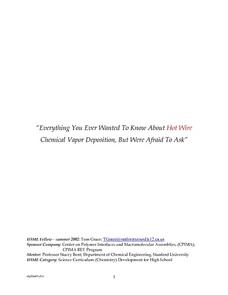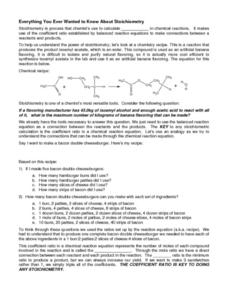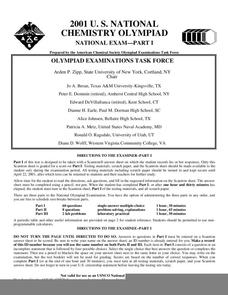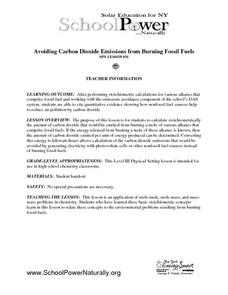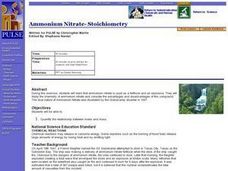Curated OER
Everything You Ever Wanted To Know About Hot Wire Chemical Vapor Deposition, But Were Afraid To Ask
To wrap up your year of general chemistry, have lab groups compete in a tot wire chemical vapor deposition (HWCVD) competition. With their foundation in chemical nomenclature, stoichiometry, and gas laws, each group completes several...
Curated OER
Everything You Ever Wanted to Know About Stoichiometry
In this chemistry worksheet, students identify the process of Stoichiometry and use it to calculate various chemical reactions similar to that of a recipe. In addition, they identify a connection between isoamyl alcohol and the product...
Curated OER
Gas Stoichiometry
In this gas stoichiometry worksheet, students use the ideal gas law and balanced chemical equations to solve for unknown values such as volume and mass of gases.
Curated OER
2007 U.S. National Chemistry Olympiad Part II
Eight multi-step chemistry problems, including analyzing a titration, writing equations, predicting products and limiting reagents, calculating concentrations of ions, and using stoichiometry to solve for unknowns in reactions make up...
Curated OER
2001 U.S. National Chemistry Olympiad Part I
Sixty multiple-choice questions test on a variety of first year chemistry subjects. In order to succeed, exam takers must be competent with properties of elements, stoichiometry problems, gas laws, bond dissociation, and types of...
Curated OER
The Stoichiometry Behind Pollution
Students research car emissions of various cars and find the toxins emitted. In this stoichiometry lesson, students calculate the relationship between reactants and products in a chemical reaction. Students collect data on...
Curated OER
Chemical Equations
Wow! This comprehensive collection of slides will walk your chemistry class through the foundation of chemical reactions, teach them to balance equations, differentiate types of reactions, and calculate stoichiometry problems. This...
Curated OER
Avoiding Carbon Dioxide Emissions from Burning Fossil Fuels
Chemistry and earth science meet in a lesson on carbon dioxide emissions. After reading about atmospheric problems caused by using fossil fuels, science stars balance equations for the burning of different alkanes. They compute the...
Curated OER
The Energy Debate - Stoichiometry
Students determine crude oil can be separated into useful fractions by a process of fractional distillation. They write a balanced equation for the reaction between a hydrocarbon and oxygen.
Pingry School
Synthesis of an Insoluble Ionic Salt: A Stoichiometry Experiment
Challenge young scientists to design their own experimental procedures. They write the procedure for properly preparing two grams of a water-insoluble ionic salt. To finish, they perform the experiment and collect data to prove their...
Curated OER
Practice Final
A full-fledged practice final prepares pupils for their general chemistry final exam. If they complete these 57 multiple-choice questions correctly, they will be well-prepared. Note: even though the questions are multiple-choice, there...
Curated OER
Stoichiometry
In this stoichiometry activity, learners use balanced equations for chemical reactions to determine the percent yield and the mass of product produced. This activity has five problems to solve.
Curated OER
Ammonium Nitrate- Stoichiometry
Students quantify the relationship between moles and mass. They comprehend that ammonium nitrate is used as a fertilizer and an explosive. Students study the chemistry of ammonium nitrate and consider the advantages and disadvantages of...
Curated OER
Vocabulary - Stoichiometry
In this stoichiometry worksheet, students write in the definition for the 6 terms associated with stoichiometry including actual yield, percent yield, and limiting reactant.
Curated OER
Energy and Stoichiometry
In this stoichiometry worksheet, students calculate the amount of heat energy released in combustion equations. This worksheet has 4 problems to solve.
Cornell University
Thin Films
Combine mathematics and science to calculate measurements of unmeasurable materials. Individuals use knowledge of density and volume to determine the thickness of the film used in production. They also apply stoichiometry to...
Normal Community High School
Mole Calculations
You didn't know you'd find moles in chemistry class! Through the introduction of moles and molar volume at STP, classes see how to calculate moles using a given chemical equation. The presentation includes a short review of ions in...
Curated OER
stoichiometric (molarity, gases, mass)
In this chemistry worksheet, students identify the volume that is required for complete precipitation. Then they identify what concentration of the base is in moles per liter. Students also name the formula weight of a hydroxide.
Curated OER
Practice Problems for the Gas Laws
In this gas laws worksheet, student practice solving problems using Graham's law, ideal gas law, and gas stoichiometry. This worksheet has 11 problems to solve.
CK-12 Foundation
Crash
Explore the chemistry behind the airbags that keep you safe in a collision. Using a simulation, your classes find the best gas to use to inflate an airbag. The simulation shows the time it takes to inflate to a maximum volume....
Curated OER
Mathematical and Chemical Relationships of Stoichiometric Problems
Students review key words used in stoichiometry such as mole, molar mass, Avogadro's number, and mass - mole relationships. They participate in a series of small experiments to explore solving stoichiometry problems in the laboratory.
Curated OER
Stoichiometry
In this stoichiometry activity, students review definitions and equations associated with molarity, density, atomic mass, molarity, and dilutions. This activity has 18 word problems.
Curated OER
Chemical Calculations and Chemical Formulas
In this stoichiometry worksheet, learners calculate molar masses, empirical and molecular formulas to solve 105 problems and short answer questions.
Curated OER
Gas Stoichiometry Practice Sheet
In this gas stoichiometry worksheet, students determine the volume of gases in 4 problems given the temperature, the pressure, and the masses of the reactants. They find the limiting reactant in one problem at STP.
